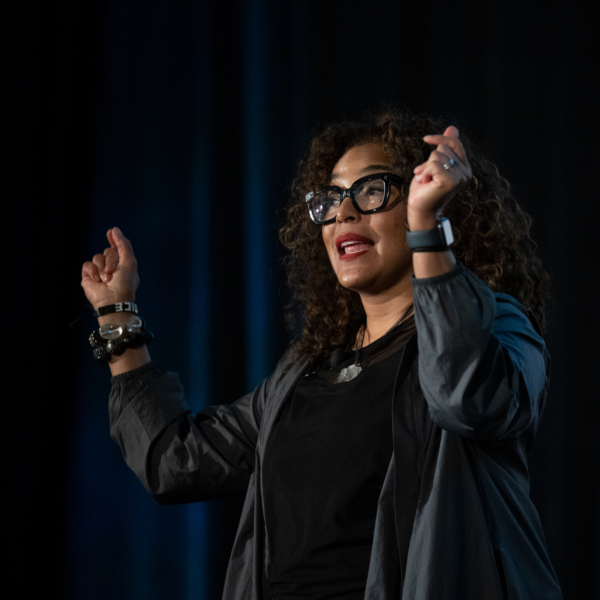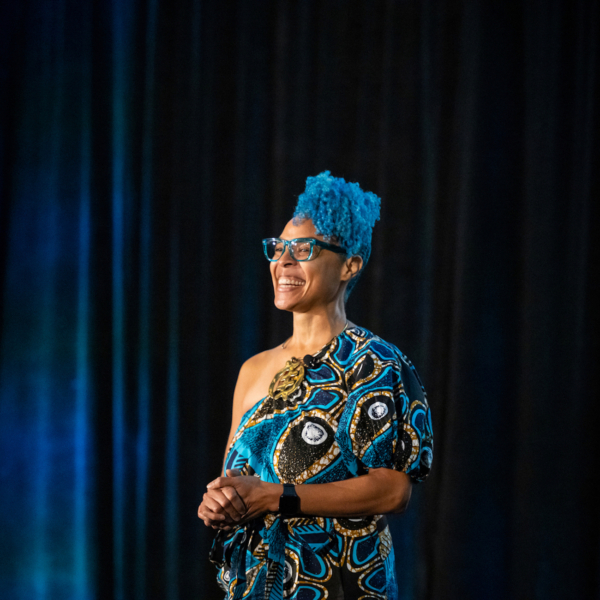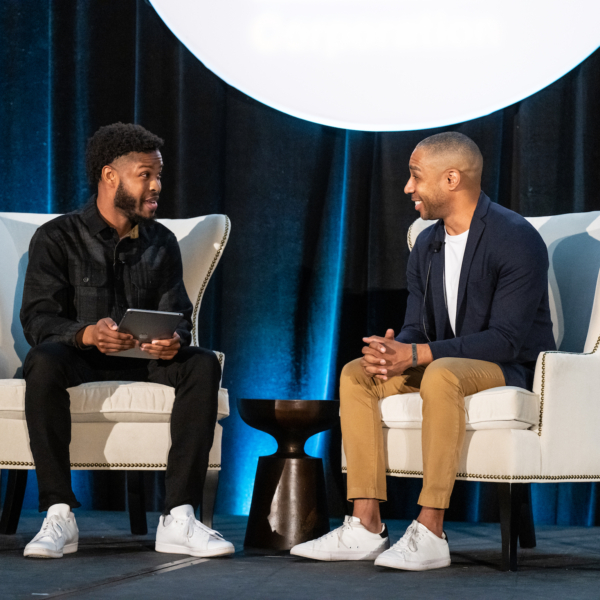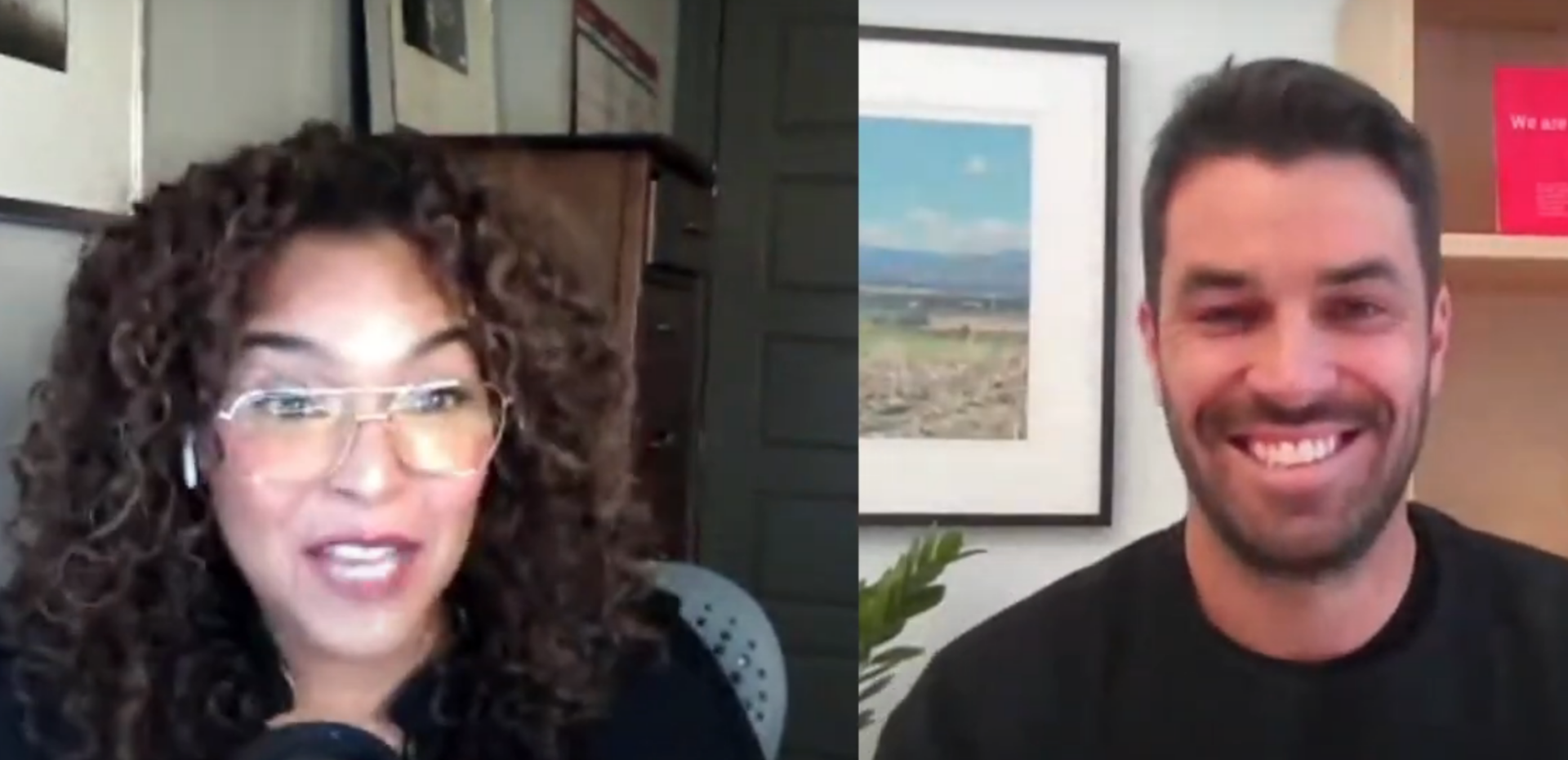How B Corps Can Commit to a Racial Equity Journey
June 8, 2023
Highlights from Listen & Level Up: Disrupting with Love and Humanity
As part of its work to build an inclusive economy that works for all people, B Lab U.S. & Canada prioritizes racial equity as one of three pillars in its Theory of Change. Initiatives in support of this include the Level program for women business owners who also identify as Black, Indigenous, or other People of Color. Through models of engagement and support on B Corp Certification, the Level program takes aim at barriers to business funding and growth these women typically face due to systemic racism.
Building on the Level program and sessions on racial equity at the Champions Retreat 2022 gathering for B Corps and partners, B Lab U.S. & Canada recently offered its first Listen & Level Up conversation on LinkedIn. The conversation featured Aurora Archer, CEO and Founder of B Corp The Opt-In, and Rooney Castle, CEO of B Corp Rhino Foods and a member of White Men for Racial Justice (WMRJ), a group of white men working to disrupt white supremacy culture with humanity and love. Vermont-based Rhino Foods has a history as an innovator of inclusive programs to support employees. These include its Income Advance program that helps workers stabilize their finances and build savings for the future, and an inclusive hiring policy that removes barriers to employment.
In an open, action-oriented Listen & Level Up conversation, Archer and Castle emphasized the importance of centering humanity and education in efforts to advance racial equity. “Despite all the well-intentioned efforts across the DEI (diversity, equity, and inclusion) landscape, we have made very little progress,” Archer said. “We have to first start with education. We have to increase the knowledge and skill set of our leaders and our organizations. And by doing that, we have to begin having the conversation that has been absent for too long within our corporate and home environments — which is, we have to talk about race.”
Advancing Racial Equity: The Challenges and Opportunities
At Champions Retreat 2022, Archer spoke during a mainstage plenary session about her experience in the Level program. In her work at The Opt-In, Archer incorporates her 25 years as a Black Latina in corporate America to help brands transform their organizational cultures and, on a broader scale, aims to help create a more equitable and inclusive economy.
Realizing an inclusive economy requires everyone to be part of the solutions, she said, especially when white families hold about 90% of wealth in the United States. Shifting to humanity-centered leadership can help us realize our connections and interdependence, she said. “New solutions reimagine ways of operating, working, and coming together as a workplace where people are seeing [they are] valued and supported versus demonized or excluded,” Archer said. “They’re really about centering humanity and showing up with our heart, which is something that has been so absent from our workplaces.”
White supremacy has created barriers to connection, she said, noting that 75% of white Americans do not have a personal or intimate relationship with a Person of Color. “It’s designed that way so that we don’t know each other,” Archer said. “The skills that we’re building as they relate to racial literacy and cultural competence, aligned to racial justice, are actually the evolution.”
Organizations like WMRJ are stepping in to dismantle white supremacy through community, education, and skill-building among white men who historically have held money and power. Castle said the WMRJ group has helped him see how intentional barriers to connection limit progress and awareness of racial equity. “How do we get people like myself to have proximity when the systems and structures are specifically designed to keep us from feeling proximate?”
As a leader of a family-owned business, Castle acknowledged the privilege of his role — and said he has embraced the opportunity for self-examination, discussions, and education to deepen his personal and business commitments to racial equity. “What keeps me showing up every Tuesday night for White Men for Racial Justice is the community that we’ve built,” he said. “But it’s really the proximity that has brought me to some of these issues — those relationships that I’ve built, and the trust that I’ve had that I’ve been able to build with the people of color in my life that now trust me enough to share their experience.”
Castle admits he started his racial equity learning journey more than two years ago with some trepidation and reluctance. “I would describe myself as clueless [before joining WMRJ] when it comes to racial equity and understanding racial issues and specifically understanding my Whiteness, and how that relates to how I move throughout the world,” he said. “The most important step for any White person to do — the most important step for me to do — was that personal excavation.”
Advancing Racial Equity: Committing to the Journey
Building on this Listen + Level Up conversation, Aurora Archer shares a call to action:
Committing to a journey of racial equity is as critical a priority as saving our planet. Persistent racial inequalities, the rise in human rights abuse and hate crimes, the glaring disparities in access to basic needs such as healthcare, education, and economic opportunity all point to the erosion of our collective humanity and threaten our social cohesion.
The Opt-In believes that achieving true diversity, equity, and inclusion requires seeing and understanding that having a culture where some identities have greater influence prevents all identities from having equal value and thus a collective humanity. By all accounts and data measures, race is the most influential of all social identities. And while only a social construct, the white race is the most advantaged social identity. Having one advantaged identity clearly means that all identities are not valued equally, thus requiring the creation of awareness around whiteness.
We cannot change what we are unwilling to see, name, and ultimately hold ourselves accountable to dismantle.
We need to stop focusing on the symptoms and address the root of the problem: which is a culture of white advantage. As Rooney Castle noted during our Listen + Level Up conversation, these social and environmental problems continue because white people hold the vast majority of power and know the least about the culture of whiteness and their white racial identities.
Currently, the symptoms most companies focus on to address their DEI gaps are recruiting and hiring, one-off bias or microaggression training and workshops, and the creation of public statements/manifestos. All of these are symptoms of a much larger problem, and the data glaringly shows us that unfortunately very little has changed:
- The representation of People of Color across all six levels in corporate America has increased a meager 2% in the last eight years.
- This disconnect affects workers at all levels. According to a Gallup poll, 32% of full and part-time employees working for organizations are now engaged, while 18% are actively disengaged.
- The attrition rate for DEI roles was 33% at the end of 2022, compared to 21% for non-DEI roles.
Understanding that achieving racial equity in the workplace may require a radical shift in approach can be deeply uncomfortable and, at times, unmooring for many leaders. The Opt-In seeks to ground leaders with optimism and non-judgment, helping them realize that they are not alone. There are steps every leader can take today that will advance their DEI efforts:
- First, assess your current strategy for achieving racial equity. Have you plateaued after writing your diversity statement, increasing your recruiting and hiring efforts, and implementing one-off training? If that is the case, assess the extent to which you are focusing on the symptoms of the problem, rather than the root cause.
- Second, resolve your ambivalence about whether you should spend resources — time and money — to address the problem. Are you radically accepting that racial equity is as urgent as climate justice? Racial equity is not “nice but not necessary.” It is part of B Lab U.S. & Canada’s mutually reinforcing three-pronged Theory of Change: racial equity, climate justice, and creating a stakeholder economy.
- Third, recognize that legacy approaches to address the symptoms of the problem aren’t effective. Instead, embrace a holistic learning approach that addresses self-awareness, racial literacy, cross-racial connection, and stamina.
We invite you to join us in opting-in to the evolution of racial equity — because we know that change is powered by businesses acting together through the B Corp movement.
Advancing Racial Equity: The Role of Vulnerability and Self-Excavation
Personal excavation requires vulnerability, which Castle said had always been a challenge for him. Through WMRJ, he has learned to change his ways and step into uncomfortable spaces and conversations. “To have this space where we can come together and learn and unlearn and reflect — and again, it’s deep personal excavation — has been transformational,” he said.
It also has shifted some of his long-held leadership behaviors and beliefs. “What I’ve learned is I’m most valuable and I have the best conversations when I’m not prepared … when I’m just trying to be myself in this moment,” Castle said. “That used to be a very scary thing, and it still is at times because I’m afraid of what I might say and what I might not say and mistakes I might make.”
Castle also has realized there is no summary document — no one-pager, as he said — to guide his lessons about racial equity. “You have to feel it. Show up with love, be unapologetic,” he said. “Go back and dig deeper: Why do I feel uncomfortable about that? What is that telling you?”
By exploring those deeper questions and investing time in self-excavation, Castle said he is becoming more than just a better business leader. “White Men for Racial Justice is rooted in racial justice work, but this is intersectional. So this is not just about how to be a better white guy to [People of Color]. This is just how to be a better human.”
Resources FOR RACIAL EQUITY:
- Seeing White podcast
- The Opt-In Podcast
- Me and White Supremacy, a book by Layla Saad
- B Corp community resources
Watch the full conversation
-

Justice, Equity, Diversity, & Inclusion
Level 2.0: Continuing the Conversation with Women of Color Changing the World
Read More -

-

-

Sign Up for our B The Change Newsletter
Read stories on the B Corp Movement and people using business as a force for good. The B The Change Newsletter is sent weekly.
